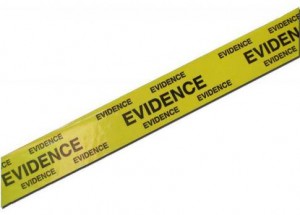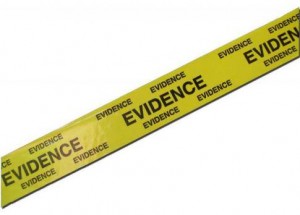 I find comfort in those two tones that indicate that an episode of a “Law and Order” franchise is coming on. I don’t mind watching reruns because I’ve usually forgotten the outcome. I feel the same way about the “CSI” franchises and the television show “House.” This might be my personal television vice, but I suspect that it’s part of a wider fascination with evidence. That is, many people have become increasingly interested in various forms of evidence– through technology, skepticism, a need for healing or a quest for justice – and how it plays out around us.
I find comfort in those two tones that indicate that an episode of a “Law and Order” franchise is coming on. I don’t mind watching reruns because I’ve usually forgotten the outcome. I feel the same way about the “CSI” franchises and the television show “House.” This might be my personal television vice, but I suspect that it’s part of a wider fascination with evidence. That is, many people have become increasingly interested in various forms of evidence– through technology, skepticism, a need for healing or a quest for justice – and how it plays out around us.
These television shows affirm some of my beliefs about the world: I love that we always leave evidence of our presence in the world. I’m interested in what evidence counts – and what’s left out – when decisions get made. I realize that it often takes a team of people to figure out what’s going on.
I thirst for evidence.
This desire for proof can also be found in faith communities. Christian scriptures often portray Jesus’ disciples as asking him for a sign. There’s one example in John 6:30.
So the disciples said to Jesus, “What sign are you going to give us then, so that we may see it and believe you? What work are you performing?
This suggests to me that even when people have committed themselves to a cause or teaching or community, they still want proof that they’re on the right track. In this case, the disciples want proof of God’s presence.
Theologians and philosophers of religion have filled volumes talking about proofs for the existence of God. Thinkers from Anselm of Canterbury to Immanuel Kant argue that we know God exists because of what we see in the world – from creation to a sense of human morality. (Of course they are referring to a particular Christian God with certain attributes.)
Likewise, religious scholars have also written extensively about religious experience. In this category, we ask: How do I know God is present? How do I know that God is with me?
In Varieties of Religious Experiences, William James interviews a number of devout Christians and concludes that people themselves know when they have experienced God. The evidence people give ranges from charismatic expressions to internal senses of peace and love.
Some communities demand more objective data. That is, other people should be able to confirm that God is present. Some insist that the ability to handle snakes or speak in tongues is necessary proof of the indwelling of God. Others find power in rituals like baptism and Eucharist. Still others argue that God’s presence should be manifest in good works and moral behavior.
The same questions can be asked in the context of depressive conditions. How do I know? What is my evidence?
Therapeutic communities are very good at gathering evidence. If I understand the DSM model correctly, many mental health conditions are determined by aggregating symptoms. Clinicians look at the evidence before them, and use this data to assess, treat, and hopefully heal. There are checklists and markers and questions. They seem to be asking the question:
How do we know when something is wrong?
In the midst of this accumulation of information, there’s something people rarely ask me when it comes to depressive conditions:
How do you know you are well?
Is it an internal feeling? New behaviors? Or does one simply fail to show the symptoms that declared one’s condition in the first place?
Here I learn from the faithful. Faith communities do not ask for proof of God’s absence. They inquire about affirmation of God’s presence. This questioning reminds me that wellness is more the absence of negative symptoms. Wellness is something positive. Wellness can actually be normal.
How do you know you are well?
For me, it’s small things.
Every day activities are everyday (not monumental feats).
Breakfast tastes good.
I laugh.
I need bits of evidence that I can piece together. Although my faith persists when I feel horrible, I’m more like the disciples than I want to admit. I need signs and wonders that I’m on the right path.
In a world that’s often more interested in what’s wrong, I find power in the evidence, however small it may be, that things are good.
* * *
A dozen theologians on how the Holy Spirit is at work today
my survivor strategies
Connect with me on facebook





Sometimes the evidence that is the most gratifying is breath coming out of our nostrils. The miracle of life is that we are alive to experience it.
all these shows makes people vegetables!